#CopyRight
Explore tagged Tumblr posts
Text
...I do kinda wonder who owns the rights to the original monsters from the show.
Cause, you'd think it'd be Hanna-Barbera, now Warner, but another thing makes me less sure.
Because, you'd think the Godzilla: the Series ones from the 90s would also be owned by its own production company at Sony.
But the Toho website's subsection where they basically let people post what's essentially legitimatized fanfic had sections for the monsters from that series. Meaning that presumably they have some sort of legal ownership of them, at least in part.
And, for further reference, CH Greenblat wanted to include this show-original character, created solely by HB for their I Dream of Jeannie animated series, in Jellystone, but couldn't because of rights conflicts"
Meaning, presumably the parent company that produced Jeannie has some rights stake in that, meaning also that might be the case with HB's Godzilla series...
...Also, appropos of nothing, here's a really good fan-animation by Vrahno of Godzilla fighting one of the more memorable monsters from that show, Axor, in the style of the classic movies:
youtube
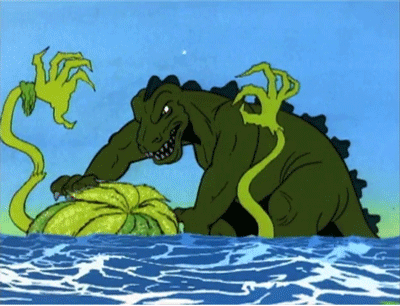
Godzilla really, really, REALLY does not like vegetables!
555 notes
·
View notes
Note
On that recent Disney Vs Midjourney court thing wrt AI, how strong do you think their case is in a purely legal sense, what do you think MJ's best defenses are, how likely is Disney to win, and how bad would the outcome be if they do win?
Oh sure, ask an easy one.
In a purely legal sense, this case is very questionable.
Scraping as fair use has already been established when it comes to text in legal cases, and infringement is based on publication, not inspiration. There's also the question of if Midjourney would be responsible for their users' creations under safe harbor provisions, or even basic understanding of what an art tool is. Adobe isn't responsible for the many, many illegal images its software is used to make, after all.
The best defense, I would say, is the fair use nature of dataset training and the very nature of transformative work, which is protected, requires the work-to-be-transformed is involved. Disney's basic approach of 'your AI knows who our characters are, so that proves you stole from us' would render fair use impossible.
I don't think its likely for Disney to win, but the problem with civil action is proof isn't needed, just convincing. Bad civil cases happen all the time, and produce case law. Which is what Disney is trying to do here.
If Disney wins, they'll have pulled off a coup of regulatory capture, basically ensuring that large media corporations can replace their staff with robots but that small creators will be limited to underpowered models to compete with them.
Worse, everything that is a 'smoking gun' when it comes to copyright infringement on Midjourney? That's fan art. All that "look how many copyrighted characters they're using-" applies to the frontpage of Deviantart or any given person's Tumblr feed more than to the featured page of Midjourney.
Every single website with user-generated content it chock full of copyright infringement because of fan art and fanfic, and fair use arguments are far harder to pull out for fan-works. The law won't distinguish between a human with a digital art package and a human with an AI art package, and any win Disney makes against MJ is a win against Artstation, Deviantart, Rule34.xxx, AO3, and basically everyone else.
"We get a slice of your cheese if enough of your users post our mouse" is not a rule you want in law.
And the rules won't be enforced by a court 9/10 times. Even if your individual work is plainly fair use, it's not going to matter to whatever image-based version of youtube's copyreich bots gets applied to Artstation and RedBubble to keep the site owners safe.
Even if you're right, you won't have the money to fight.
Heck, Adobe already spies on what you make to report you to the feds if you're doing a naughty, imagine it's internal watchdogs throwing up warnings when it detects you drawing Princess Jasmine and Ariel making out. That may sound nuts, but it's entirely viable.
And that's just one level of possible nightmare. If the judgement is broad enough, it could provide a legal pretext for pursuing copyright lawsuits over style and inspiration. Given how consolidated IP is, this means you're going to have several large cabals that can crush any new work that seems threatening, as there's bound to be something they can draw a connection to.
If you want to see how utterly stupid inspiration=theft is, check out when Harlan Ellison sued James Cameron over Terminator because Cameron was dumb enough to say he was inspired by Demon with a Glass Hand and Soldier from the Outer Limits.
Harlan was wrong on the merits, wrong ethically, and the case shouldn't have been entertained in the first place, but like I said, civil law isn't about facts. Cameron was honest about how two episodes of a show he saw as a kid gave him this completely different idea (the similarities are 'robot that looks like a guy with hand reveal' and 'time traveling soldier goes into a gun store and tries to buy future guns'), and he got unjustly sued for it.
If you ever wonder why writers only talk about their inspirations that are dead, that's why. Anything that strengthens the "what goes in" rather than the "what goes out" approach to IP is good for corps, bad for culture.
144 notes
·
View notes
Text

Maybe One Day.
Maybe one day,
we’ll turn the lines that split us
into paths that meet in peace.
Maybe one day,
the thunder of war will quiet,
and wisdom will finally speak.
Hearts will open wider
than any flag or land,
and hands will build together
no evil power could withstand.
Nations will rise—not above,
but beside—
to mend the cracks,
to heal with love, not pride.
And maybe then,
unity won’t feel like a dream—
but the way we breathe,
the way we live,
the way we all begin again.
~beccawise7💜🖤
#©️#published work#copyright#my writing#war and peace#war and conflict#poets on tumblr#writers and poets#poetry#peace#end war#humanity#connection#my thoughts#love more#be a good human#human kindness#kindness is free#more love#peaceful#world wars#conflict#coexistence#a new hope#friday feels
30 notes
·
View notes
Text
This is very useful to know what counts as a short quotation!
TOS Spotlight: Plagiarism and Copyright Infringement
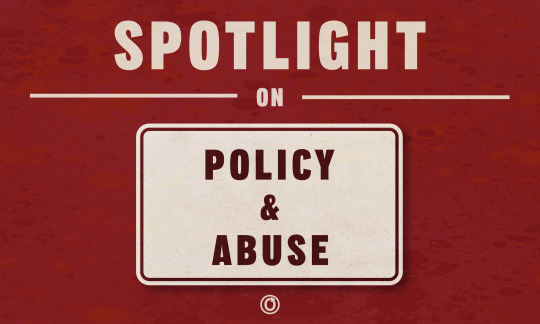
The Policy & Abuse committee is posting a weekly spotlight series explaining some of the most common violations of the #AO3 Terms of Service. This week's spotlight is on plagiarism and copyright infringement. Read more at: https://otw-news.org/4a4nf8un
391 notes
·
View notes
Text
I Grieved
I grieved for you
You were gone from me, before you were gone
Not but ten feet away
And I grieved for you
You were gone from me
The words of the father, written by the daughter
They left deep marks on this soul
I grieved for you
You were gone from me
Images of my greatest betrayal were painted on my canvas
My downfall haphazardly flung across it
This painting was your greatest betrayal
I grieved for you
So far gone from me
Your smile greeted me, sickly sweet
Bitter and sweet
Distasteful
I grieved for you, and your smile was payment
My shining sun, my radiant moon
Now so dark, no light to be cast in my world
The father's words, written by the daughter
Penned in blood from my racing heart
They told stories of our hands held together around your undoing
Naught but stories
I still grieved for you
The daughters passing, the fathers lies
The last time our hands ever held the other, wrapped warmly around your storied passing
I did grieve
You were gone from me
- J.Lamana
© 2025 picklemafia/J.Lamana | Reposting on this platform is permitted with proper credit. Reposting on other platforms is not allowed. No edits. All rights reserved.
#poetry#original poem#poem#original poetry#poets on tumblr#poems and poetry#writers and poets#I Grieved#copyright
23 notes
·
View notes
Text
It looks like Mickey has something to say
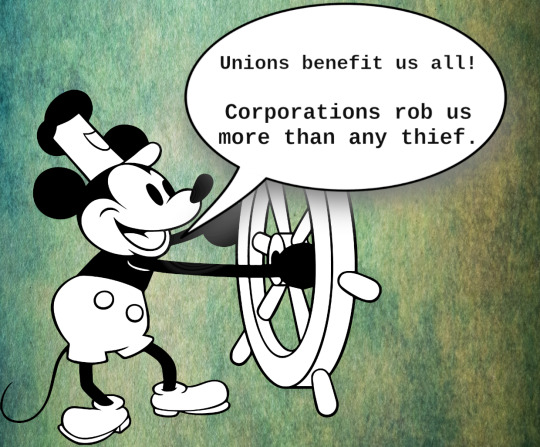
60K notes
·
View notes
Text

Recently, one of Oliver Clegg’s “works” came to my attention again.
It left me with deep pain and sadness.
I have no intention of blaming the person who posted it, nor those who informed me. But—
Please take a moment to imagine:
What if a photo you love—of something, someone, or some animal you hold dear—
was traced without permission, presented as someone else’s artwork, renamed, and
spread further by well-meaning people, ultimately generating income for someone else?
This is not just between me and him. It could happen to any of us, at any time, with someone like him.
I have consulted a lawyer specializing in international copyright through a project supported by Japan’s Agency for Cultural Affairs.
I understand some people still say “it’s not a big deal.”
That is exactly why I’d like to share a few facts:
His actions are tracing, which is different from imitation or reference.
At least for my photo, this cannot be considered fair use.
His website is accessible from Japan, and therefore infringes upon Japanese copyright.
My rights are protected internationally under the Berne Convention.
I am not trying to stop anyone from appreciating his work.
But I do want the facts to be recognized.
Oliver Clegg is still clearly and deliberately violating both the law and the rights of individuals.
As those who follow my work may know, neither of my cats is named “Rocky.”
I have identified at least seven of his images as traced.
On April 30th (JST), I informed his gallery and requested an investigation.
I sent a follow-up on May 3rd, asking for a response by the end of business on May 6th (local time).
To date, I have received no reply.
Perhaps they believe the words of a Japanese blogger are not worth acknowledging.
So be it.
Let me be clear: I am not seeking compensation or an apology.
All I want is for people to understand that this is a repeated pattern of appropriation.
Among the seven traced works:
One is my own photo.
One is the work of Staice Shitanda, as shared with me.
One is a Getty-managed image. If that is the only image he sought permission for, it would suggest a disregard for individual rights.
One is a published book image.
One comes from a private blog, even if it later became a meme.
One appears across Pinterest and social media, but originates from an individual's SNS post.
One features a well-known Japanese cat, for which I personally contacted their official in 2023 and was told they had never been approached by Clegg.
These images all match in composition and linework, and cannot reasonably be considered imitation or reference.
While I will not repost the artwork or comparison images here, I am prepared to share my documentation with media or art professionals who wish to investigate further.
2025.5.7 straycatj
#art theft#oliver clegg#copyright#猫#cat#art#not rocky only sucky#straycatj#unauthorized artwork#digital art ethics#photo rights#art appropriation#plagiarism in art
4K notes
·
View notes
Text
“If buying isn’t owning, piracy isn’t stealing”
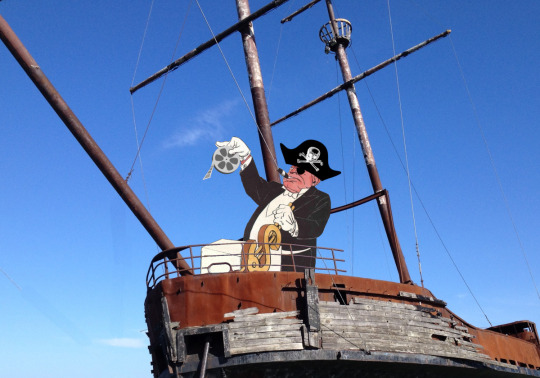
20 years ago, I got in a (friendly) public spat with Chris Anderson, who was then the editor in chief of Wired. I'd publicly noted my disappointment with glowing Wired reviews of DRM-encumbered digital devices, prompting Anderson to call me unrealistic for expecting the magazine to condemn gadgets for their DRM:
https://longtail.typepad.com/the_long_tail/2004/12/is_drm_evil.html
I replied in public, telling him that he'd misunderstood. This wasn't an issue of ideological purity – it was about good reviewing practice. Wired was telling readers to buy a product because it had features x, y and z, but at any time in the future, without warning, without recourse, the vendor could switch off any of those features:
https://memex.craphound.com/2004/12/29/cory-responds-to-wired-editor-on-drm/
I proposed that all Wired endorsements for DRM-encumbered products should come with this disclaimer:
WARNING: THIS DEVICE’S FEATURES ARE SUBJECT TO REVOCATION WITHOUT NOTICE, ACCORDING TO TERMS SET OUT IN SECRET NEGOTIATIONS. YOUR INVESTMENT IS CONTINGENT ON THE GOODWILL OF THE WORLD’S MOST PARANOID, TECHNOPHOBIC ENTERTAINMENT EXECS. THIS DEVICE AND DEVICES LIKE IT ARE TYPICALLY USED TO CHARGE YOU FOR THINGS YOU USED TO GET FOR FREE — BE SURE TO FACTOR IN THE PRICE OF BUYING ALL YOUR MEDIA OVER AND OVER AGAIN. AT NO TIME IN HISTORY HAS ANY ENTERTAINMENT COMPANY GOTTEN A SWEET DEAL LIKE THIS FROM THE ELECTRONICS PEOPLE, BUT THIS TIME THEY’RE GETTING A TOTAL WALK. HERE, PUT THIS IN YOUR MOUTH, IT’LL MUFFLE YOUR WHIMPERS.
Wired didn't take me up on this suggestion.
But I was right. The ability to change features, prices, and availability of things you've already paid for is a powerful temptation to corporations. Inkjet printers were always a sleazy business, but once these printers got directly connected to the internet, companies like HP started pushing out "security updates" that modified your printer to make it reject the third-party ink you'd paid for:
https://www.eff.org/deeplinks/2020/11/ink-stained-wretches-battle-soul-digital-freedom-taking-place-inside-your-printer
Now, this scam wouldn't work if you could just put things back the way they were before the "update," which is where the DRM comes in. A thicket of IP laws make reverse-engineering DRM-encumbered products into a felony. Combine always-on network access with indiscriminate criminalization of user modification, and the enshittification will follow, as surely as night follows day.
This is the root of all the right to repair shenanigans. Sure, companies withhold access to diagnostic codes and parts, but codes can be extracted and parts can be cloned. The real teeth in blocking repair comes from the law, not the tech. The company that makes McDonald's wildly unreliable McFlurry machines makes a fortune charging franchisees to fix these eternally broken appliances. When a third party threatened this racket by reverse-engineering the DRM that blocked independent repair, they got buried in legal threats:
https://pluralistic.net/2021/04/20/euthanize-rentier-enablers/#cold-war
Everybody loves this racket. In Poland, a team of security researchers at the OhMyHack conference just presented their teardown of the anti-repair features in NEWAG Impuls locomotives. NEWAG boobytrapped their trains to try and detect if they've been independently serviced, and to respond to any unauthorized repairs by bricking themselves:
https://mamot.fr/@[email protected]/111528162905209453
Poland is part of the EU, meaning that they are required to uphold the provisions of the 2001 EU Copyright Directive, including Article 6, which bans this kind of reverse-engineering. The researchers are planning to present their work again at the Chaos Communications Congress in Hamburg this month – Germany is also a party to the EUCD. The threat to researchers from presenting this work is real – but so is the threat to conferences that host them:
https://www.cnet.com/tech/services-and-software/researchers-face-legal-threats-over-sdmi-hack/
20 years ago, Chris Anderson told me that it was unrealistic to expect tech companies to refuse demands for DRM from the entertainment companies whose media they hoped to play. My argument – then and now – was that any tech company that sells you a gadget that can have its features revoked is defrauding you. You're paying for x, y and z – and if they are contractually required to remove x and y on demand, they are selling you something that you can't rely on, without making that clear to you.
But it's worse than that. When a tech company designs a device for remote, irreversible, nonconsensual downgrades, they invite both external and internal parties to demand those downgrades. Like Pavel Chekov says, a phaser on the bridge in Act I is going to go off by Act III. Selling a product that can be remotely, irreversibly, nonconsensually downgraded inevitably results in the worst person at the product-planning meeting proposing to do so. The fact that there are no penalties for doing so makes it impossible for the better people in that meeting to win the ensuing argument, leading to the moral injury of seeing a product you care about reduced to a pile of shit:
https://pluralistic.net/2023/11/25/moral-injury/#enshittification
But even if everyone at that table is a swell egg who wouldn't dream of enshittifying the product, the existence of a remote, irreversible, nonconsensual downgrade feature makes the product vulnerable to external actors who will demand that it be used. Back in 2022, Adobe informed its customers that it had lost its deal to include Pantone colors in Photoshop, Illustrator and other "software as a service" packages. As a result, users would now have to start paying a monthly fee to see their own, completed images. Fail to pay the fee and all the Pantone-coded pixels in your artwork would just show up as black:
https://pluralistic.net/2022/10/28/fade-to-black/#trust-the-process
Adobe blamed this on Pantone, and there was lots of speculation about what had happened. Had Pantone jacked up its price to Adobe, so Adobe passed the price on to its users in the hopes of embarrassing Pantone? Who knows? Who can know? That's the point: you invested in Photoshop, you spent money and time creating images with it, but you have no way to know whether or how you'll be able to access those images in the future. Those terms can change at any time, and if you don't like it, you can go fuck yourself.
These companies are all run by CEOs who got their MBAs at Darth Vader University, where the first lesson is "I have altered the deal, pray I don't alter it further." Adobe chose to design its software so it would be vulnerable to this kind of demand, and then its customers paid for that choice. Sure, Pantone are dicks, but this is Adobe's fault. They stuck a KICK ME sign to your back, and Pantone obliged.
This keeps happening and it's gonna keep happening. Last week, Playstation owners who'd bought (or "bought") Warner TV shows got messages telling them that Warner had walked away from its deal to sell videos through the Playstation store, and so all the videos they'd paid for were going to be deleted forever. They wouldn't even get refunds (to be clear, refunds would also be bullshit – when I was a bookseller, I didn't get to break into your house and steal the books I'd sold you, not even if I left some cash on your kitchen table).
Sure, Warner is an unbelievably shitty company run by the single most guillotineable executive in all of Southern California, the loathsome David Zaslav, who oversaw the merger of Warner with Discovery. Zaslav is the creep who figured out that he could make more money cancelling completed movies and TV shows and taking a tax writeoff than he stood to make by releasing them:
https://aftermath.site/there-is-no-piracy-without-ownership
Imagine putting years of your life into making a program – showing up on set at 5AM and leaving your kids to get their own breakfast, performing stunts that could maim or kill you, working 16-hour days during the acute phase of the covid pandemic and driving home in the night, only to have this absolute turd of a man delete the program before anyone could see it, forever, to get a minor tax advantage. Talk about moral injury!
But without Sony's complicity in designing a remote, irreversible, nonconsensual downgrade feature into the Playstation, Zaslav's war on art and creative workers would be limited to material that hadn't been released yet. Thanks to Sony's awful choices, David Zaslav can break into your house, steal your movies – and he doesn't even have to leave a twenty on your kitchen table.
The point here – the point I made 20 years ago to Chris Anderson – is that this is the foreseeable, inevitable result of designing devices for remote, irreversible, nonconsensual downgrades. Anyone who was paying attention should have figured that out in the GW Bush administration. Anyone who does this today? Absolute flaming garbage.
Sure, Zaslav deserves to be staked out over an anthill and slathered in high-fructose corn syrup. But save the next anthill for the Sony exec who shipped a product that would let Zaslav come into your home and rob you. That piece of shit knew what they were doing and they did it anyway. Fuck them. Sideways. With a brick.
Meanwhile, the studios keep making the case for stealing movies rather than paying for them. As Tyler James Hill wrote: "If buying isn't owning, piracy isn't stealing":
https://bsky.app/profile/tylerjameshill.bsky.social/post/3kflw2lvam42n

If you'd like an essay-formatted version of this post to read or share, here's a link to it on pluralistic.net, my surveillance-free, ad-free, tracker-free blog:
https://pluralistic.net/2023/12/08/playstationed/#tyler-james-hill

Image: Alan Levine (modified) https://pxhere.com/en/photo/218986
CC BY 2.0 https://creativecommons.org/licenses/by/2.0/
#pluralistic#playstation#sony#copyright#copyfight#drm#monopoly#enshittification#batgirl#road runner#financiazation#the end of ownership#ip
23K notes
·
View notes
Text

oh my GOD I've known for about a month now that Disney was getting ready to go public with the Midjourney court case and it was SO HARD. TO STAY SILENT. all I've been able to do for like 2 years is go "trust me Disney is cooking something" and now it's finally starting.
like. I cannot emphasize enough how this is seriously going to destroy unethical LLMs. this isn't just about Midjourney, it's going to affect all the shitty art theft companies. they've been working on this a long time to ensure it's airtight.
Disney is evil, but for this battle, their interests align with ours. it's gonna be a long court case but at least we're finally gonna start seeing a shift now in regards to LLMs.
1) Disney will not be able to monopolize unethical LLMs bc they'll be illegal if Disney wins. legislation will need to be written to uphold the ruling.
-----------
EDIT: adding to this bc the techbro psyops found it and are trying to convince y'all this is a bad thing.
2) this is literally just Disney saying "LLMs should be subject to copyright law like everything else". only reason it wasn't is bc we didn't have it in legal writing yet. this court case will prompt it being written.
3) this means absolutely nothing else about copyright is changing. fair use, transformative work, and IP laws stay the same. nothing will change for anyone except techbro shills. we'll finally be protected from them.
4) I can't believe I have to say this but copyright is a good thing. it can be abused (there's room to criticize about HOW it's applied), but it's the only thing protecting small artists and individuals from their labor being stolen. anyone who whines about copyright as a whole being evil is a techbro who wants to steal your money and labor.
5) please. please remember copyright is completely separate from IP law. Disney will not be able to outlaw "style theft", that's still under fair use. their argument against LLMs lies solely in the fact that LLMs use the source material directly in computing an output, and is unable to create an output without said source material. this is how it's different from human-guided machines like digital art programs--those don't require copyright work to create any output.
6) not saying there's a 0% chance of something going wrong but there's a reason artists are excited about this. we have good reason to be optimistic. the court case is airtight--it fully refutes all arguments techbros make in defence of unethical LLMs.
7) being happy about Enemy 1 killing Enemy 2 does not mean anyone suddenly loves Enemy 1. nobody is celebrating Disney. we're celebrating LLMs losing. Disney being evil doesn't mean we can't be happy about Evil 2 dying.
8) techbros keep crying it's so fucking funny
2K notes
·
View notes
Text
Some people say that in order to be effective, post-apocalyptic fiction needs to strike a balance between having the cause of the apocalypse reflect contemporary anxieties, and framing that cause in a way that's at least somewhat plausible. These people are cowards. Write that story where the extinction of the human species was caused by overzealous copyright enforcement. You know you want to.
6K notes
·
View notes
Text
Happy Public Domain Day 2025!
It is the first of January, so works from 1929 are now public domain in the United States. Here are some of them.
youtube
The Skeleton Dance, drawn by Ub Iwerks, music by Carl Stalling.
youtube
The Cocoanuts, the first Marx Brothers film (not counting an earlier unreleased silent film).
youtube
"Ain't Misbehavin'," by Andy Razaf, Fats Waller, Harry Brooks. (Only the composition is public domain, not this particular recording, which is from 1943. But hey, any chance to play a clip from Stormy Weather is a good one.)
youtube
“Rhapsody in Blue,” performed by Paul Whiteman and His Orchestra. (As a sound recording -- the composition, by George Gershwin, was already public domain.)
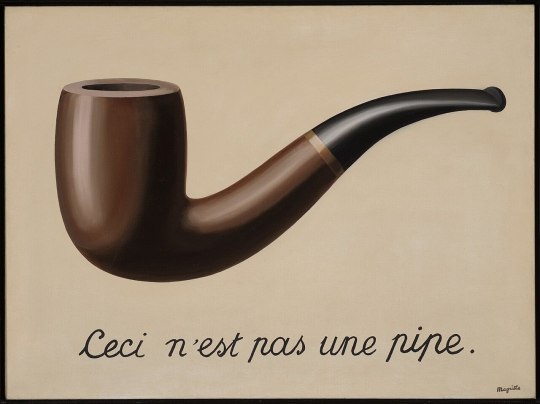
The Treachery of Images, by René Magritte.
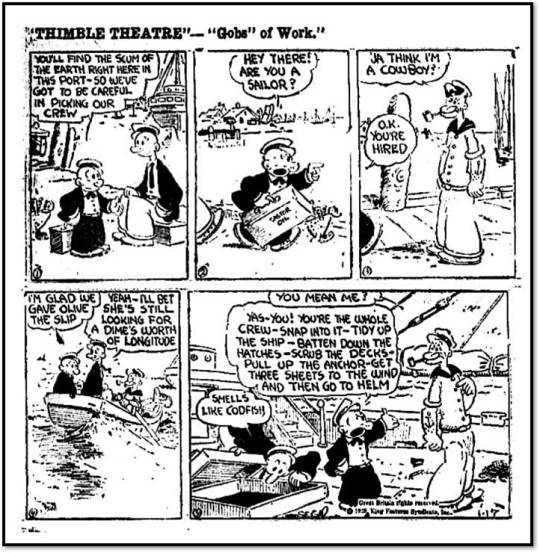
The earliest "Thimble Theaters" comics featuring Popeye the Sailor.

A Farewell to Arms, by Ernest Hemingway
And many, many other works, which you can read about here. Happy Public Domain Day!
4K notes
·
View notes
Text
Copy Right and Public Domain in 2025!
It's January 1st 2025 which means it's my favorite unsung holiday! Public Domain Day! This is the day once a year when, in the US, copyrights expire and things enter the public domain, meaning they belong to everyone! even you, Steve!
American copyright for books, movies, art work, and musical compositions (but not recordings, more on that later) runs for 95 years (way too long!) so today works published in 1929 join us in the public domain.
So whats free? so glad you asked.
Popeye the Sailor Man

Many people assume Popeye originated as a cartoon character but thats not true, he comes from a comic strip. The strip was called Thimble Theatre and Popeye was something of a late addition. Thimble Theatre was first published in 1919, so Popeye's girlfriend Olive Oyl has been in the public domain since before the big 20 year copyright freeze of 1998-2019. Popeye first appeared as a minor character 10 years into the strip's run but was so popular he soon took over and the strip would be renamed Popeye less than 5 years later. Now as always whats public is only what appears in 1929, later developments, remain copyrighted. Such as, while Popeye always had super strength its not till 1932 his superpowers were tied to eating spinach, and Olive Oyl originally had a different boyfriend named Ham Gravy, who she dumped for Popeye when he became the main character. It looks like Popeye is following tradition for famous now public domain characters and getting a quicky horror movie this year.
Tintin!

This is personally very exciting as someone who grew up with the Belgian boy detective. Like Popeye I expect a lot of people don't know that Tintin started off as a weekly comic strip. Indeed Tintin appeared as a part of a weekly youth supplement in the Catholic newspaper The Twentieth Century. Any ways, Tintin was first published in there in January 1929, and soon would start what would become the first Tintin story, Tintin in the Land of the Soviets. Now only part of Tintin in the Land of the Soviets was published in 1929, the story line wrapped up in May 1930, so only those 1929 stories and what appears in them is free and clear and Tintin was published in black and white not color. Tintin's author Hergé had no idea what he was doing and was really learning on the job so In The Land of the Soviets is generally seen as his weakest outing and the only one he never opted to redraw in later years. Even so it's nice to see the character free in the world. No word on if Tintin will star in a horror movie.
Buck Rogers (but not really)
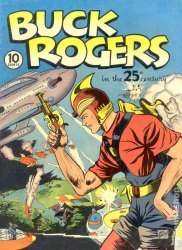
The original futuristic space man was published, again a comic strip, in 1929 which means he should enter the public domain today, but he won't. That's because he already is public domain! Before the Copyright Act of 1976 copyright was 28 years with the option to renew for another 28 years. The copyright on the original comic strips was not renewed so ran out at the end of 28 years, 1958. So Buck Rogers has been free and clear for close to 70 years now, whatever you hear about him today.
What else?
Famously last year Mickey Mouse entered the public domain, but all the entered public domain was one (maybe two) animated short, Steamboat Willie. Well this year a dozen Mickey Mouse animated shorts enter the public domain, including the first time Mickey has his iconic white gloves, and the first time Mickey speaks (the first thing Mickey Mouse ever says, voiced by Walt Disney himself, is "Hot dogs! Hot dogs!" in case you were wondering) This will give creators much more to work with if they want to use Mickey in their works which is exciting.
Speaking of Walt Disney, The Skeleton Dance is entering public domain, you likely don't know the title but I suspect you've seen at least part of it at some point

so look for this showing up on TVs in the backgrounds of films and TV shows in the next year or so
Books
The iconic novels of World War I, Ernest Hemingway's A Farewell to Arms and Erich Maria Remarque's All Quiet on the Western Front enter public domain. In fact All Quiet on the Western Front entered public domain last year, but only in the original German, the 1929 translation by Arthur Wesley Wheen is whats entered the public domain now. John Steinbeck's first novel, Cup of Gold, William Faulkner's The Sound and the Fury, Virginia Woolf's A Room of One's Own, and Agatha Christie's Seven Dials Mystery (always get an Agatha Christie novel on this list for the rest of our lives). Dashiell Hammett published both Red Harvest and The Maltese Falcon, later made into one of the greatest films of all time, in 1929. Future children's book author E. B. White (who's go on to write Charlotte's Web and Stuart Little) and future New Yorker cartoonist and humorist James Thurber teamed up to write the delightfully titled Is Sex Necessary? Or, Why You Feel the Way You Do a book of spoof essays making fun of popular books on Freudian sexual theories at the time. The Roman Hat Mystery the first of the long running Ellery Queen mysteries was published, Queen would keep publishing mysteries into the 1970s (and Ellery Queen was a pen name for two people). Richard Hughes' A High Wind in Jamaica and Oliver La Farge's Laughing Boy also came out in 1929 and are in the public domain now. There's much else but those are the highlights sorry if I missed your favorite 1929 novel.
Movies
Alfred Hitchcock and Cecil B. DeMille's first movies with sound, Blackmail and Dynamite respectively, came out in 1929. Marx Brothers' first feature film The Cocoanuts joins the public domain. Other comedy land marks are Harold Lloyd's first sound film, Welcome Danger and Buster Keaton's last silent film, Spite Marriage (which Keaton also directed). John Ford's first sound film, The Black Watch, which also is 21 year old John Wayne's first appearance in a film, as an uncredited extra, he worked in the art department. Hallelujah the first studio film to have an all black cast came out that year. Also worth noting is The Hollywood Revue of 1929 a singing and dancing review, one of the earliest and the movie that popularized the song Singin’ in the Rain, maybe the first time a movie made a song a hit.
Musical compositions
musical compositions, ie the lyrics and musical notations you might see on sheet music are governed by the 1976 Copyright Act, and music written in 1929 is public domain. Music recordings are governed by a whole different law (we'll get there). Songs written in 1929 include Singin’ in the Rain by Arthur Freed & Nacio Herb Brown, Ain’t Misbehavin’ and Black and Blue by the legendary Fats Waller, What Is This Thing Called Love? by Cole Porter, Tiptoe Through the Tulips by Alfred Dubin, You Were Meant for Me by Arthur Freed & Nacio Herb Brown, and also Happy Days Are Here Again by Jack Yellen which would become FDR's campaign theme song in 1932.
Art!
a number of pieces by Salvador Dalí including:
Illumined Pleasures
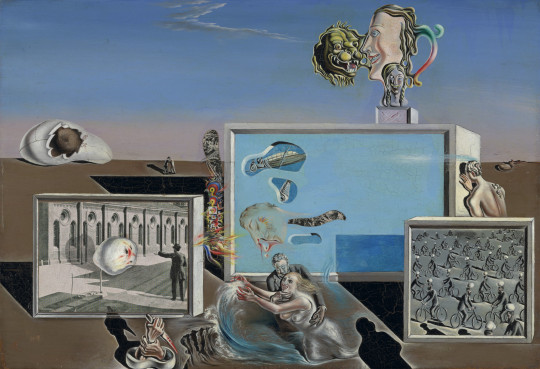
The Accommodations of Desire
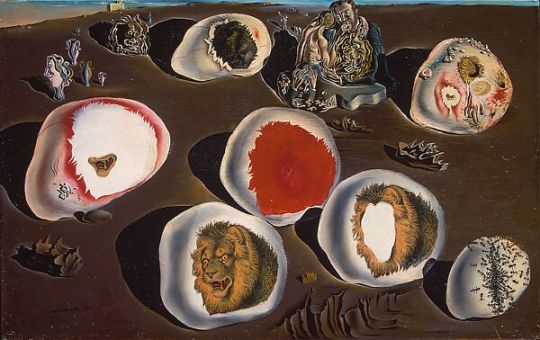
The Great Masturbator
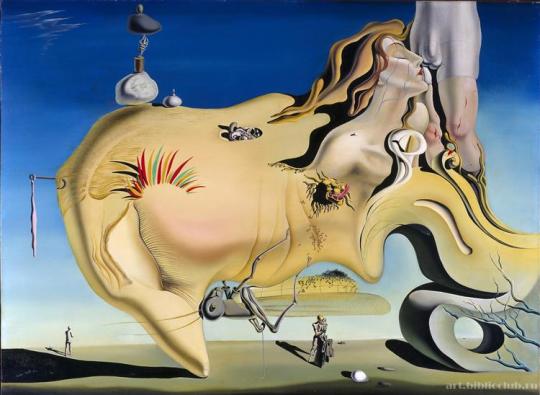
are entering the public domain as is René Magritte’s The Treachery of Images.
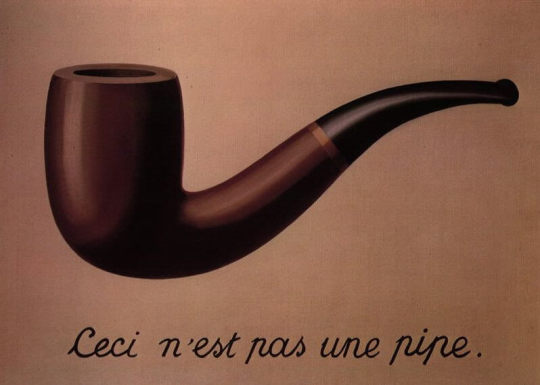
Art is hard because while movies and books are clearly "published" and put on sale, what counts as "published" for a piece of art? the law is not totally sure.
Musical Recordings
as I promised, we got here. Till 2017 there were no federal laws governing the copyright of music recordings before the 1970s, it was governed by a confusing patchwork of state laws and it was not totally clear what was or was not free and clear even from the very earliest recordings ever. Now the term of a music recording's copyright is set at 100 years (way too long) so music recorded in 1924 is now public domain such as. Nobody Knows the Trouble I’ve Seen by Marian Anderson, Everybody Loves My Baby (But My Baby Don’t Love Nobody But Me) by Louis Armstrong, California Here I Come by Al Jolson, Rhapsody in Blue by George Gershwin, Shreveport Stomp by Jelly Roll Morton, Mama’s Gone, Good Bye by Ray Miller, and It Had To Be You by Marion Harris. Now many recordings a lot less famous can finally be preserved and digitized to save them for the next 100 years. Many abandoned works are literally rotting away since without the copyright holder's permission digitizing a work isn't legal.
#Copyright#public domain#public domain day#Popeye#Tintin#the adventures of tintin#Mickey Mouse#Disney#buster keaton#the marx brothers#louis armstrong#cole porter#singin' in the rain#alfred hitchcock#salvador dali#Agatha Christie#Ernest Hemingway#virginia woolf#John Steinbeck#William Faulkner
3K notes
·
View notes
Text
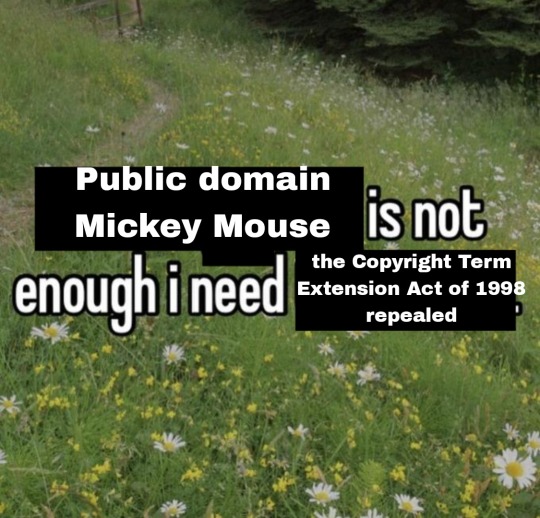
#mickey mouse#steamboat willie#disney#copyright#please holy shit that act was so bad why is no one trying to repeal this#public domain
17K notes
·
View notes
Text
The US Copyright Office is opening a public comment period around AI
American friends! The US Copyright Office (which we know exerts huuuge influence in how these things are treated elsewhere) wants to hear opinions on copyright and AI.
"The US Copyright Office is opening a public comment period around AI and copyright issues beginning August 30th as the agency figures out how to approach the subject."
We can assume that the opposing side will definitely be using all of their lobbying power towards widespread AI use, so this is a very good chance to let them know your thoughts on AI and how art and creative content of all kinds should be protected.
25K notes
·
View notes
